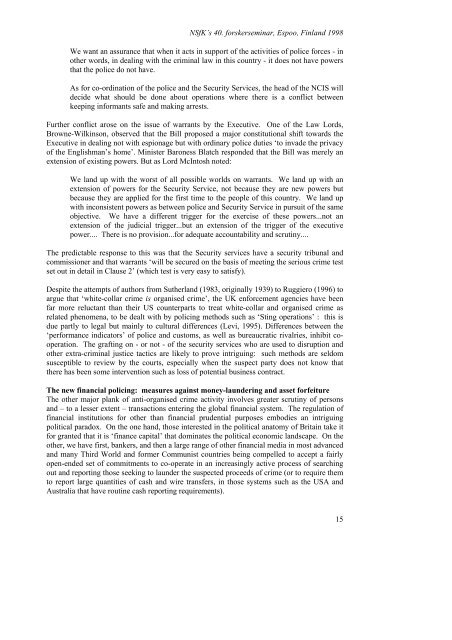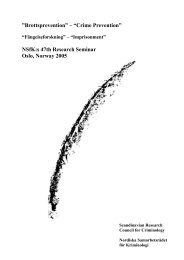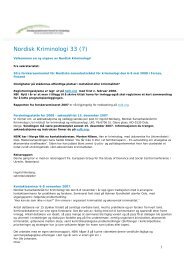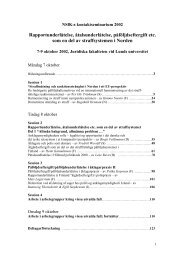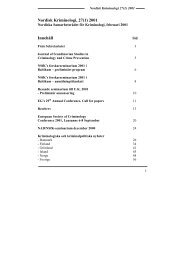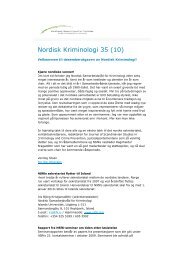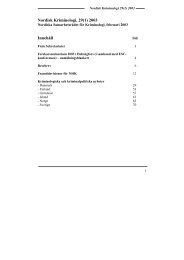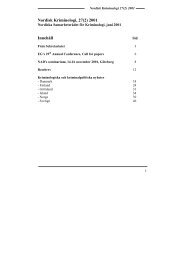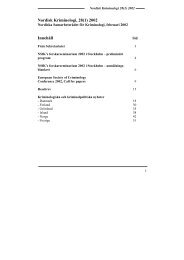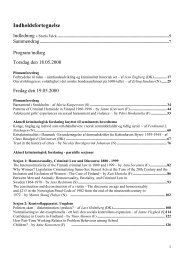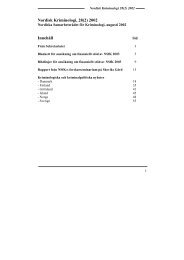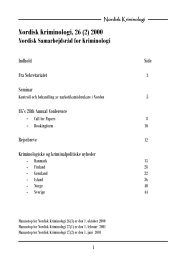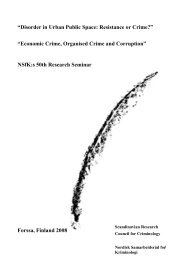Organised Crime & Crime Prevention - what works? - Scandinavian ...
Organised Crime & Crime Prevention - what works? - Scandinavian ...
Organised Crime & Crime Prevention - what works? - Scandinavian ...
Create successful ePaper yourself
Turn your PDF publications into a flip-book with our unique Google optimized e-Paper software.
NSfK’s 40. forskerseminar, Espoo, Finland 1998<br />
We want an assurance that when it acts in support of the activities of police forces - in<br />
other words, in dealing with the criminal law in this country - it does not have powers<br />
that the police do not have.<br />
As for co-ordination of the police and the Security Services, the head of the NCIS will<br />
decide <strong>what</strong> should be done about operations where there is a conflict between<br />
keeping informants safe and making arrests.<br />
Further conflict arose on the issue of warrants by the Executive. One of the Law Lords,<br />
Browne-Wilkinson, observed that the Bill proposed a major constitutional shift towards the<br />
Executive in dealing not with espionage but with ordinary police duties ‘to invade the privacy<br />
of the Englishman’s home’. Minister Baroness Blatch responded that the Bill was merely an<br />
extension of existing powers. But as Lord McIntosh noted:<br />
We land up with the worst of all possible worlds on warrants. We land up with an<br />
extension of powers for the Security Service, not because they are new powers but<br />
because they are applied for the first time to the people of this country. We land up<br />
with inconsistent powers as between police and Security Service in pursuit of the same<br />
objective. We have a different trigger for the exercise of these powers...not an<br />
extension of the judicial trigger...but an extension of the trigger of the executive<br />
power.... There is no provision...for adequate accountability and scrutiny....<br />
The predictable response to this was that the Security services have a security tribunal and<br />
commissioner and that warrants ‘will be secured on the basis of meeting the serious crime test<br />
set out in detail in Clause 2’ (which test is very easy to satisfy).<br />
Despite the attempts of authors from Sutherland (1983, originally 1939) to Ruggiero (1996) to<br />
argue that ‘white-collar crime is organised crime’, the UK enforcement agencies have been<br />
far more reluctant than their US counterparts to treat white-collar and organised crime as<br />
related phenomena, to be dealt with by policing methods such as ‘Sting operations’ : this is<br />
due partly to legal but mainly to cultural differences (Levi, 1995). Differences between the<br />
‘performance indicators’ of police and customs, as well as bureaucratic rivalries, inhibit cooperation.<br />
The grafting on - or not - of the security services who are used to disruption and<br />
other extra-criminal justice tactics are likely to prove intriguing: such methods are seldom<br />
susceptible to review by the courts, especially when the suspect party does not know that<br />
there has been some intervention such as loss of potential business contract.<br />
The new financial policing: measures against money-laundering and asset forfeiture<br />
The other major plank of anti-organised crime activity involves greater scrutiny of persons<br />
and – to a lesser extent – transactions entering the global financial system. The regulation of<br />
financial institutions for other than financial prudential purposes embodies an intriguing<br />
political paradox. On the one hand, those interested in the political anatomy of Britain take it<br />
for granted that it is ‘finance capital’ that dominates the political economic landscape. On the<br />
other, we have first, bankers, and then a large range of other financial media in most advanced<br />
and many Third World and former Communist countries being compelled to accept a fairly<br />
open-ended set of commitments to co-operate in an increasingly active process of searching<br />
out and reporting those seeking to launder the suspected proceeds of crime (or to require them<br />
to report large quantities of cash and wire transfers, in those systems such as the USA and<br />
Australia that have routine cash reporting requirements).<br />
15


